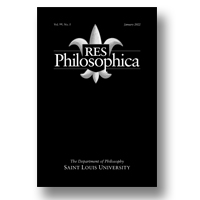|
articles |
|
1.
|
Res Philosophica:
Volume >
100 >
Issue: 3
Richard Brian Davis
C. S. Lewis’s Argument against Naturalism Revisited
abstract |
view |
rights & permissions
| cited by
In this article, I critically assess Peter van Inwagen’s rejection of C. S. Lewis’s argument against Naturalism. Van Inwagen argues that Lewis (1960) errs on two fronts. First, he falsely assumes that Naturalism implies Spinozism: that the only way the world could be is the way it is. Second, the central premise of Lewis’s argument is asserted without proof. I argue that van Inwagen is mistaken on both counts.
|
|
|
|
|
2.
|
Res Philosophica:
Volume >
100 >
Issue: 3
Chang Liu
Eidetic Variation as a Source of Metaphysical Knowledge:
A Phenomenological Contribution to Neo-Aristotelian Metaphysics
abstract |
view |
rights & permissions
| cited by
In neo-Aristotelian accounts, the task of metaphysics is to explore the space of metaphysical possibilities, and our knowledge of metaphysical possibilities is ultimately grounded on our knowledge concerning the essence of entities. Eidetic variation, as established by Husserlian phenomenology, is a method of identifying a specific pattern of phenomenological givenness that is constitutive of the identity and condition of existence of a kind of entities. Thus, Husserlian phenomenology provides us with a method to acquire knowledge concerning the general essence of entities.
|
|
|
|
|
3.
|
Res Philosophica:
Volume >
100 >
Issue: 3
Alexander T. Englert
Kant’s Favorite Argument for Our Immortality:
The Teleological Argument
abstract |
view |
rights & permissions
| cited by
Kant’s claim that we must postulate the immortality of the soul is polarizing. While much attention has been paid to two standard arguments in its defense (one moral-psychological, the other rational), I contend that a favorite argument of Kant’s from the apogee of his critical period—namely, the teleological argument—deserves renewed attention. This article reconstructs the argument and exhibits what makes it unique (though not necessarily superior) in relation to the other arguments. In particular, its form (as third-personal or descriptive, beginning from observations) and related force of assent (as a subjectively universal reflective judgment) set it apart from the other arguments. My goal is to establish that any engagement with Kant’s immortality postulate must include equal consideration of the teleological argument to be complete.
|
|
|
|
|
4.
|
Res Philosophica:
Volume >
100 >
Issue: 3
Daniele Mezzadri
Kant on the Nature of Logical and Moral Laws
abstract |
view |
rights & permissions
| cited by
In this article I engage with a recent debate vis-à-vis Kant’s conception of logic, which deals with whether Kant saw logical laws as normative for, or rather as constitutive of, the faculty of understanding. On the former view, logical laws provide norms for the correct exercise of the understanding; on the latter, they define the necessary structure of the faculty of understanding per se. I claim that these two positions are not mutually exclusive, as Kant held both a normative and a constitutive conception of logic. I also sketch a parallelism between Kant’s conceptions of logic and of ethics: Kant’s twofold conception of logic parallels his view of moral laws as normative (for the human will) but constitutive (of a holy will).
|
|
|
|
|
discussion |
|
5.
|
Res Philosophica:
Volume >
100 >
Issue: 3
Tristan Grøtvedt Haze
Modal Inertness and the Zombie Argument
abstract |
view |
rights & permissions
| cited by
This article proposes a way of blocking the zombie argument against materialism. The central idea—which can be motivated in various ways, but which I will motivate by drawing on recent work by Wolfgang Schwarz—is that sentences reporting conscious experience are modally inert, roughly in the sense that adding them to a description of a metaphysically possible scenario always results in a description of a metaphysically possible scenario. This is notable in that it leads to a way of blocking the zombie argument, which is perfectly compatible with modal rationalism and with the view that conceivability entails possibility.
|
|
|
|
